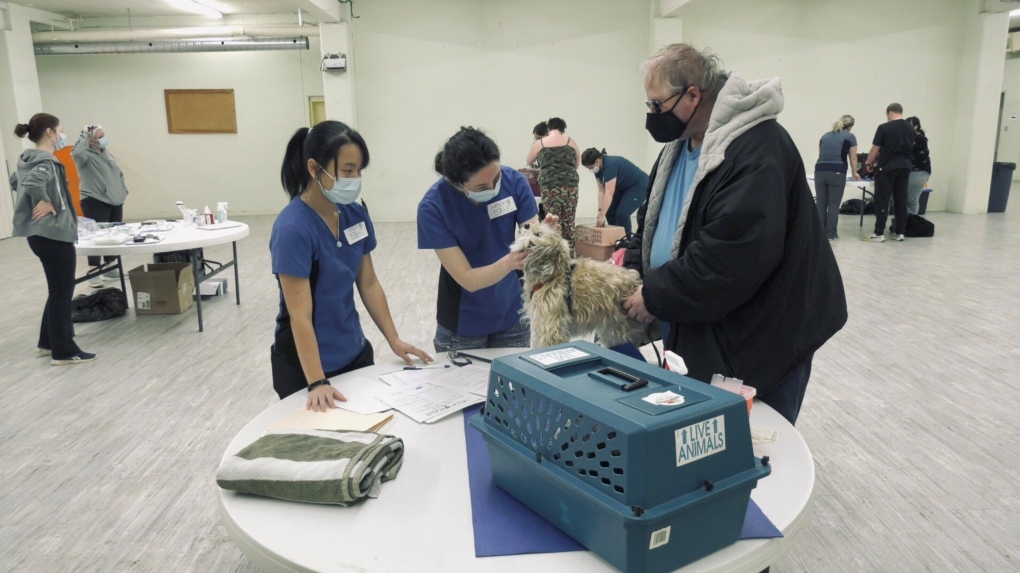SPCA donates 500 microchips to free vet clinic in Nanaimo
 The free vet clinic called Helping Paws is a volunteer-based program made up of local veterinarians, animal technicians and reception staff who give pet owners basic care for their furry loved-ones. (CTV)
The free vet clinic called Helping Paws is a volunteer-based program made up of local veterinarians, animal technicians and reception staff who give pet owners basic care for their furry loved-ones. (CTV)
A free animal wellness clinic that helps homeless and low-income pet owners in Nanaimo receive veterinary care for free is celebrating its third anniversary with a gift of 500 microchips from the BC SPCA.
The free vet clinic called Helping Paws is a volunteer-based program made up of local veterinarians, animal technicians and reception staff who give pet owners basic care for their furry loved-ones.
The once-a-month clinic provides examinations, vaccinations, flea and tick medications, deworming and treatment for some simple medical conditions.
“The last two years with COVID has been hard on veterinary staff," says Dr. Courtenay Large, founder of Helping Paws. "There has been shortages, everybody is overworked, but doing something like this really brings back the joy of why you got into the profession in the first place."
“Every single vet that I have met in Nanaimo, animal care and welfare is their primary reason for being and it shows that they’re here wanting to help those people who can’t access regular vet care,” says Leon Davis, BC SPCA's senior manager for the Island and Coastal region.
The BC Pet Registry, which is run by the BC SPCA, has supplied the clinic with 500 microchips that will supply all the pets they see this year with one.
“A microchip is permanent. It never goes away. It can always be scanned. It can always be read,” says Large.
“It’s number one way that we find animals get home, (it's) animals that have microchips,” adds Davis.
The Helping Paws clinic is held once a month at St. Peter’s Church on Machleary Street in Nanaimo.
More information about the clinic including dates and times can be found on its Facebook page.
CTVNews.ca Top Stories

Doctors say capital gains tax changes will jeopardize their retirement. Is that true?
The Canadian Medical Association asserts the Liberals' proposed changes to capital gains taxation will put doctors' retirement savings in jeopardy, but some financial experts insist incorporated professionals are not as doomed as they say they are.
Something in the water? Canadian family latest to spot elusive 'Loch Ness Monster'
For centuries, people have wondered what, if anything, might be lurking beneath the surface of Loch Ness in Scotland. When Canadian couple Parry Malm and Shannon Wiseman visited the Scottish highlands earlier this month with their two children, they didn’t expect to become part of the mystery.
What do weight loss drugs mean for a diet industry built on eating less and exercising more?
Recent injected drugs like Wegovy and its predecessor, the diabetes medication Ozempic, are reshaping the health and fitness industries.
2 military horses that broke free and ran loose across London are in serious condition
Two military horses that bolted and ran miles through the streets of London after being spooked by construction noise and tossing their riders were in a serious condition and required operations, a British government official said Thursday.
'It was instant karma': Viral video captures failed theft attempt in Nanaimo, B.C.
Mounties in Nanaimo, B.C., say two late-night revellers are lucky their allegedly drunken antics weren't reported to police after security cameras captured the men trying to steal a heavy sign from a downtown business.
Fair in Ontario, flurries in Labrador: Weather systems make for an erratic spring
It's no secret that spring can be a tumultuous time for Canadian weather, and as an unseasonably mild El Nino winter gives way to summer, there's bound to be a few swings in temperature that seem out of the ordinary. From Ontario to the Atlantic, though, this week is about to feel a little erratic.
He replaced Mickey Mantle. Now baseball's oldest living major leaguer is turning 100
The oldest living former major leaguer, Art Schallock turns 100 on Thursday and is being celebrated in the Bay Area and beyond as the milestone approaches.
What a urologist wants you to know about male infertility
When opposite sex couples are trying and failing to get pregnant, the attention often focuses on the woman. That’s not always the case.
Made-in-Newfoundland vodka claims top prize at worldwide competition
A Newfoundland-made vodka has been named one of the world’s best by judges at this year’s World Vodka Awards.
































